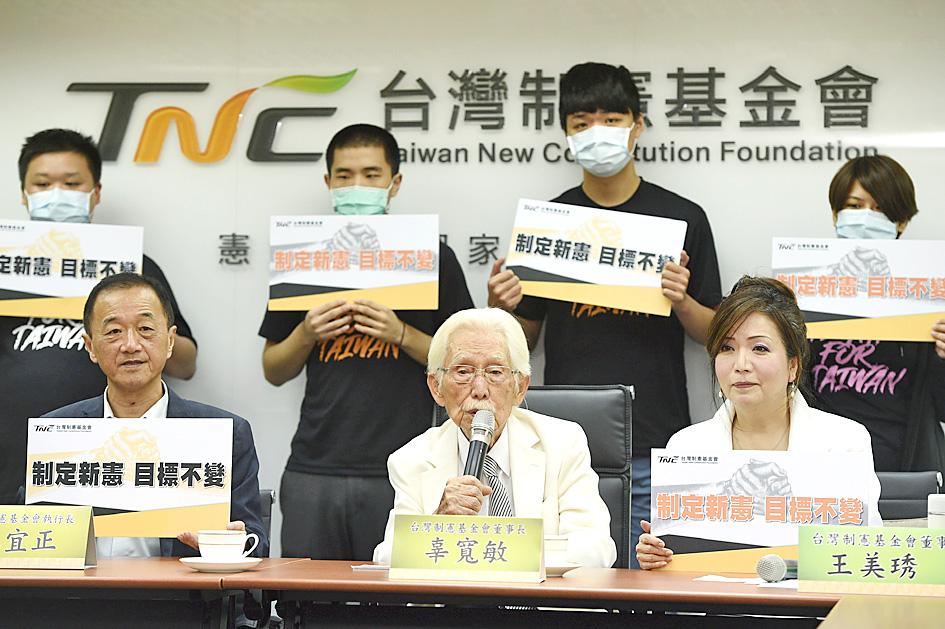The Taiwan New Constitution Foundation yesterday said it would call for constitutional interpretations and is considering submitting other referendum proposals, following the rejection on Friday of its two referendum proposals on constitutional reform.
The Central Election Commission rejected the proposals without clarifying its reasoning, foundation chairman Koo Kwang-ming (辜寬敏) told a news conference in Taipei.
“The greatest obstacle to the nation’s normalization and development is the Republic of China [ROC] Constitution,” he said, adding that democracies use referendums, not revolutions, to solve problems.
The 95-year-old said he has spent a half-century fighting for Taiwan, with the biggest changes coming over the past few decades in the wake of democratization.
Although the nation’s civic consciousness and international standing have improved, they are still lacking, he said.
Considering how “miserable” Taiwan was under former president Chiang Kai-shek (蔣介石), “how could the Republic of China brought by Chiang be our country?” Koo asked, adding that the nation therefore needs to draft a new constitution, so that its future can be determined by its 23 million citizens.
However, Taiwan’s biggest issue is that it is “not a normal nation,” Koo said, adding that even President Tsai Ing-wen (蔡英文) of the Democratic Progressive Party (DPP) sings the line “foundation of our party” in the national anthem and still uses the name “Republic of China.”
“Can she not use the ‘Republic of Taiwan’?” he asked, saying that Tsai is still not willing to drop the ROC name, despite polls showing that more than 90 percent of Taiwanese support the nation’s normalization.
Taiwanese support self-determination, but even with the DPP in power, the nation is still governed by a constitution that was not drafted by the nation’s people, meaning that Taiwanese are not governing themselves, Koo said.
As his time is limited, Koo said he is determined for his last contribution to be constitutional reform, and vowed to fight for the nation’s normalization, despite the difficulty of the task.
“I will not leave the DPP, nor will I resign as a presidential adviser, but I will continue pushing for a new constitution,” he said.
Koo and his contemporaries have fought for decades to establish a normalized nation on Taiwan, yet they have come up against a wall: the DPP government, foundation director Michelle Wang (王美琇) said.
The Constitution entangles Taiwan with China and traps the nation in an abnormal situation, making it impossible to even change its name to “Taiwan,” Wang said.
It is understandable that some people are fond of the ROC name, but with the global situation changing in the wake of the COVID-19 pandemic, Taiwanese do not want their nation to be confused with China, she said.
The Constitution prevents Taiwan from having a proper place in the international community, let alone call itself Taiwan, Wang added.
Aside from calling for a constitutional interpretation, the foundation is also considering forming an alliance with other organizations to continue pushing for constitutional reform, she added.
Source: Taipei Times - 2020/10/20





















